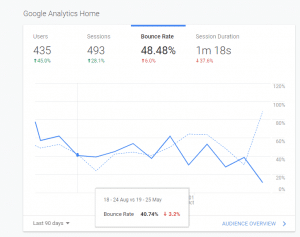Maybe you’re interested in optimizing your website because you are trying to grow a group practice.
That’s actually how I first got interested in SEO. I’d filled my solo practice pretty quickly with referrals from former colleagues and friends. However, when I started bringing on 1099s, everyone calling wanted to talk to me. After all, they’d heard about what a great clinician I was. The problem? I was full and I really wanted to fill up my 1099s so they’d be able to make a living and stick with my new group practice!
Enter: SEO. As I optimized my group practice, people began finding Aspire Counseling online. Thus, they began calling Aspire Counseling not Jessica Tappana. Now, it was much easier to point them in the direction of the therapist who best met their needs (specialty area, open appointment times, etc).
“About” Pages for Therapists

I recommend every group practice has an “our team” type page. On this page, include a photo of every practitioner in your group as well as a paragraph or two about that person. I usually write this for my therapists. On this page, I do my best to capture who they are as a therapist and their personality.
I also consider keywords when describing each therapist’s specialty. Basically, you want to give a quick summary of the clinician and what they treat but also try to help the page rank for their specialty. For instance, “Diana is a very active therapist, who gives you very specific skills you can use. She regularly works with the following: military members, military families, trauma survivors, clients with PTSD, depression and clients seeking DBT.” One note about this part, if you notice that a lot of your clients are coming in seeking a specific type of treatment here is the place to list it. I find that a lot of people will come in looking for DBT and EMDR. I don’t mention a lot of treatment modalities by name on this page, but DBT and EMDR are the two I’ll directly mention since we have so many people searching for those.
The founders of the group practice should not be at the top of the drop-down list of providers
Create individual pages for each therapist in your group practice
Here’s what I ask my clinicians to have on their page:
-
At least 500 words
-
They include some keywords and topics that I suggest. I base my suggestions on what people in our area are searching for.
-
3 photos – We often include one more professional headshot, one more casual photo of the clinician and one photo of something important to them. Many of my clinicians choose a picture of a pet for the third picture, though some have also included their own artwork or a picture of a favorite saying.
Should I pay to have individual therapist pages optimized on my group practice website?
Have all your new clinicians identify their niche and create service pages

Even if a therapist thinks that they are a “generalist,” they still should be able to describe a few specialties that they are very effective in treating. Once they do this, you can identify what types of specialty pages you need on your site.
Won’t I eventually have too many service pages?
Strongly encourage your therapists to write blog posts that will help you rank for their specialties and increase inquiries
Internal Links from Service Pages
that anymore. I learned this lesson the hard way! What I learned is that when a therapist leaves, I then have to go and unlink a bunch of pages, or I have accidentally forgotten to update it.
The one time I link to an individual therapist’s page
Begin optimizing your website with Simplified SEO Consulting
Ranking well as a group practice doesn’t have to be complicated. We love working with group practice owners! As a group practice owner myself, I have a real soft spot for working with everyone from therapists just expanding into the group practice arena to owners of large, multi-site practices. If you are ready for your private practice to get to the top of Google, we would love to help! To use any of our SEO services, please follow the simple steps below to get started:
- Book a free 15-minute consultation,
- Speak to one of our SEO specialists to find what service or package is the best fit for your private practice,
- Start ranking better on Google and get more clients!
Other SEO Services offered by Simplified SEO Consulting
Simplified SEO Consulting is pleased to offer you a variety of SEO services designed to meet your needs as a private practice owner. If you’re too busy and don’t have time to optimize your website, we offer the popular Done for You SEO Services. With this package, our team of SEO specialists will optimize your page for you. If you are the do-it-yourself type, we can help you too. We have SEO training packages designed to teach you the skills you need to get your website ranking well. A great place to start is with our “Top of Google” online course! In 2020, we’re excited to begin offering “Top of Google” 2.5 Day SEO Workshops. These intensive trainings are held in various parts of the country. Contact us with specific questions, or book a free SEO Consultation to decide which service is best for your practice.

About the author:
Jessica Tappana is a therapist, group practice owner & an SEO expert. Jessica is passionate about helping therapists and their ideal clients find one another. She believes quality mental health care can change the world. Her group practice has grown primarily through great SEO. It now has seven clinicians and one virtual assistant and she still sees around 10 individual therapy clients a week herself. However, most of her focus has shifted to helping other therapists around the world rank better on Google.








 I think our natural instinct is to cut expenses. The first year I certainly reacted this way. I kind of panicked to be honest. But then, I did some research and learned. I realized that these slow downs were natural, to be expected. I personally started using Profit First to better management my finances.
I think our natural instinct is to cut expenses. The first year I certainly reacted this way. I kind of panicked to be honest. But then, I did some research and learned. I realized that these slow downs were natural, to be expected. I personally started using Profit First to better management my finances. Private practice owners always tell me they don’t have time to write blog posts. I get it, we’re busy. However, you’re bound to have cancellations in your practice this month. So, use this rare gift of time your clients will give you. Write ahead as many blog posts as you can! They don’t have to be perfect. Just choose topics relevant to your ideal clients,
Private practice owners always tell me they don’t have time to write blog posts. I get it, we’re busy. However, you’re bound to have cancellations in your practice this month. So, use this rare gift of time your clients will give you. Write ahead as many blog posts as you can! They don’t have to be perfect. Just choose topics relevant to your ideal clients,  I typically recommend that you optimize around 3-4 pages per month for Search Engine Optimization. In fact, when people want to optimize more I often remind them that slow and steady wins the race and by optimizing just 3-4 we can tweak our strategy after just a few pages. However…slow times are an exception. Right now, you want to do as much work as possible as quickly as possible so you are ranking well come January.
I typically recommend that you optimize around 3-4 pages per month for Search Engine Optimization. In fact, when people want to optimize more I often remind them that slow and steady wins the race and by optimizing just 3-4 we can tweak our strategy after just a few pages. However…slow times are an exception. Right now, you want to do as much work as possible as quickly as possible so you are ranking well come January. You can find the bounce rate for your counseling website in Google Analytics by going to the home page, and there on the main screen is a percentage. This percentage is your bounce rate!
You can find the bounce rate for your counseling website in Google Analytics by going to the home page, and there on the main screen is a percentage. This percentage is your bounce rate!




 you really want to feel better from depression, and how counseling can help with depression. However, we often need to include some sort of call to action to encourage people to take the next step from reading and digesting this information to actually acting.
you really want to feel better from depression, and how counseling can help with depression. However, we often need to include some sort of call to action to encourage people to take the next step from reading and digesting this information to actually acting. Another addition you can include on many of your website pages is a small section at the bottom of the page our SEO team often call the ‘Other Services’ section. So, the subheading might read: “Other mental health services offered by ABC Counseling Center,” or something like that. I recommend including this on all of your service pages and on many blog posts as well. For example, we’ll have a paragraph mentioning that we know that mental health is complicated, so depression counseling isn’t the only thing that we do at ABC Counseling. We also offer anxiety treatment, common meditation training, couples counseling, etc. Then, you can include an internal link back to each of those services.
Another addition you can include on many of your website pages is a small section at the bottom of the page our SEO team often call the ‘Other Services’ section. So, the subheading might read: “Other mental health services offered by ABC Counseling Center,” or something like that. I recommend including this on all of your service pages and on many blog posts as well. For example, we’ll have a paragraph mentioning that we know that mental health is complicated, so depression counseling isn’t the only thing that we do at ABC Counseling. We also offer anxiety treatment, common meditation training, couples counseling, etc. Then, you can include an internal link back to each of those services.
 Mason here to add my two cents on what exactly high quality backlinks are and how to go about getting them. At this point, perhaps you know what a backlink is. A backlink is a link from someone else’s website to yours. These help Google know that you are an authority as well as that the content you are putting into the world is worth putting at the top of the pile.
Mason here to add my two cents on what exactly high quality backlinks are and how to go about getting them. At this point, perhaps you know what a backlink is. A backlink is a link from someone else’s website to yours. These help Google know that you are an authority as well as that the content you are putting into the world is worth putting at the top of the pile.

 Mason Aid is a Mental Health SEO Specialist at Simplified SEO Consulting. They offer copywriting services for therapists including writing blog posts tailored to the unique needs of your practice. In addition, Mason provides “Done for You” services for busy therapists needing a monthly SEO package that will save them time. Mason has years of experience with Square Space websites and works with most of our Square Space and Wix clients. In their off time, Mason is an advocate for the LGBTQ community and is teaching employers, teachers and mental health professionals how to be more inclusive of the LGBTQ community. In fact, Mason is in the process of launching their own
Mason Aid is a Mental Health SEO Specialist at Simplified SEO Consulting. They offer copywriting services for therapists including writing blog posts tailored to the unique needs of your practice. In addition, Mason provides “Done for You” services for busy therapists needing a monthly SEO package that will save them time. Mason has years of experience with Square Space websites and works with most of our Square Space and Wix clients. In their off time, Mason is an advocate for the LGBTQ community and is teaching employers, teachers and mental health professionals how to be more inclusive of the LGBTQ community. In fact, Mason is in the process of launching their own 